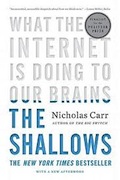The Shallows: What the Internet is Doing to our Brains by Nicholas Carr

Norton, 2010. ISBN: 978-0-393-33975-8. List price $15.95.
On Amazon for less.
I didn’t need a book to tell me that too much time on the internet was bad for me, so I didn’t think I needed to read The Shallows. I was wrong. This summer, I took The Shallows on several long plane flights. Those flights gave me time to read and think, without any distractions from the Internet. It got me thinking how my reading habits have changed and how computer use was affecting me and my children.The Shallows is the most thought-provoking new book I have read in years. I’m not alone. It was a finalist for the Pulizer Prize. Not the rant I feared, The Shallows is a thoughtful mix of two subjects: how brains work and how new technologies have changed people over the centuries.

Even if you spend no time on the Internet, consider this book to help you understand the world your children are growing up in, the world in which they will work. If you worry about your children using the Internet, you probably think the solution is limiting time and controlling content. But this book shows we also should be concerned about how the medium, the Internet, affects us, and the worldview implicit—not in websites, but in web-surfing, in “being connected.”
Beginning with his personal story, Nicholas Carr admits what he loves about the Internet, and how he sees it shaping how he thinks. It is clearly a mixed blessing. Like Carr, I have found it to be an invaluable research tool, but with a cost. Carr writes: “The very way my brain worked seemed to be changing… . At first I’d figured that the problem was a symptom of middle-age mind rot. But my brain, I realized, wasn’t just drifting. It was hungry. It was demanding to be fed the way the Net fed it—and the more it was fed the hungrier it became. Even when I was away from my computer, I yearned to check-email, click links, do some Googling.” (p. 16)
Ever felt that way? Do you need to go on an Internet diet?
Carr writes well, with vivid metaphors: “Once I was a scuba diver in the sea of words. Now I zip along the surface like a guy on a Jet Ski.” (p. 7). “We are evolving… to being hunters and gatherers in the electronic data forest.” (p. 138)
Carr’s research netted some interesting stories. Surveying technology over the centuries, he raises and answers thought-provoking questions: how did inventions—not just television, personal computers, and the Internet, but also books, maps, clocks, and printing presses—change how people think. For example:
- Socrates worried that putting words in books would cause people to neglect memorization.
- In early books, words ran together without spaces. Most people read out loud, partly because it made it easier to sound out the words. The invention of spaces between words led to widespread silent reading. Silent reading helped people to develop the mental discipline to follow a long chain of reasoning, stretching their minds, pondering, synthesizing, and responding. Carr argues that this skill is what we are losing.
- When illness made German philosopher Nietzsche unable to use a pen, he switched to an early typewriter. When a close friend saw his writing style had become more succinct and forceful, he replied, “Our writing equipment takes part in the forming of our thoughts.” (p. 19.)
What does this matter for us as parents and educators? We can hardly expect our children to spend their lives apart from the Internet. Won’t limiting their time online solve the problem? Carr argues it will not. Here are some key points for us to consider as parents and educators:
- We focus on content of the web. We need to pay attention to the affects the medium has on how we behave.
- Jakob Nielsen researched how people read online: “How do users read on the web? They don’t.” (p. 135) If you doubt it, try teaching someone how to use the Internet. You will likely find yourself annoyed as they stop to read each page. As one communications expert admitted, he scolded a friend, “You’re not supposed to read web pages, just click on the hypertexted words!” (p. 7)
- Google is paid by the click, and it has trained us to click. “The more we use the web, the more we train our minds to be distracted.” (p. 194.)
- Students reading two articles on the web with hyperlinks connecting the articles, do not remember as much as students who read the same text without hyperlinks.
- Cruising the Internet makes us feel engaged and smart, because we are constantly judging whether and where to click, and how many seconds to linger on each page. But all those decisions, jumps, and changes in focus interfere with our ability to build long-term memories.
We need to teach our children to use the Internet wisely and to be wary of its allure. I suggest you read this book to start you thinking about how you are thinking.
The Shallows: What the Internet is Doing to Our Brains is available on Amazon. If you purchase it using the link below, a portion of your purchase will support this website. Thank you.

